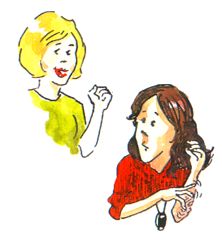Success with habit reversal for chronic atopic eczema

Success with habit reversal for chronic atopic eczema
Habit reversal is called for when apparently optimal conventional treatment of acute atopic eczema fails to achieve complete healing and the skin shows continuing evidence of habitual scratching. This common physical complication can lead to a common psychological complication, passive pessimism. This needs taking into account if habit reversal is going to have a chance of being successful: an educational approach is recommended.
- Understanding habitual scratching
Regular rubbing and scratching damages the skin and prevents healing. When this is repeated often enough it becomes a habit: at least some of it becomes unconscious, and becomes provoked not only by itch but also by circumstances. Before starting habit reversal, awareness of scratching is needed, and this needs to continue as habit reversal is used - for habit reversal to be successful.
- Involve others
Involving others can make all the difference!
At assessment, more is taken on board.
Later, discussing the programme increases commitment.
Being appropriately prompted as one goes along can be really helpful.

And it is good celebrating with others when the skin clears!
- Maintaining habit reversal
Habit reversal need not take long to reduce the frequency of habitual scratching. With preliminary awareness training habit reversal can have an effect in only a few days. However, in order for this to allow complete skin healing, the reduction in scratching needs to be maintained for about four weeks, and combined with optimised conventional treatment. Habit reversal for chronic atopic eczema is not a quick fix.
- Combining habit reversal with optimised conventional treatment
Because chronic atopic eczema is relatively unresponsive to conventional topical treatment, it is often found when habit reversal is being considered that, despite previous instruction, the usual use of emollients and topical steroids has become both sub-optimal and no longer well understood. Unless time is taken to explain the rationale of moisturising and anti-inflammatory therapy, and guidance is given on its appropriate use, the results using habit reversal will be poor. There needs to be a Combined Approach - as set out in the clinic patient handbooks "Live Without Eczema" and the self-help book "The Eczema Solution". Moreover this continues to be especially important, but without habit reversal, if successful treatment is later to be maintained long-term.
- Stress
In clinic people usually report having chronic atopic eczema is stressful, and that stress itself worsens their atopic eczema. Stress evidently contributes to atopic eczema becoming chronic. Fortunately, regardless of stress, it is possible usually to start habit reversal with The Combined Approach, and by the end of the second week of the treatment programme there is such an improvement in the skin condition that stress is no longer reported an issue. However, a stress management programme may be necessary for some, when stress makes it impossible to start The Combined Approach successfully. Moreover, combining stress management with habit reversal can be an effective strategy, when habit reversal alone is difficult to put into practice.
|
|
- Attitudes
The passive pessimism that learning to "Live With Eczema" can bring may originate at least partly in the attitudes of others. The beliefs of friends, family and even health care professionals can limit the expectations of treatment and lead to difficulties in benefiting from habit reversal. The educational approach outlined above can help challenge these beliefs. But for attitudinal change, even better in our experience is to suspend initial disbelief with enough infectious optimism to at least get habit reversal in The Combined Approach started. With support, initial success can come quickly, generating a new active optimism that allows successful completion of the programme. Being able to "Live Without Eczema" becomes then the new attitude, enabling continuing success with the future management of acute eczema flare-ups.
See also
